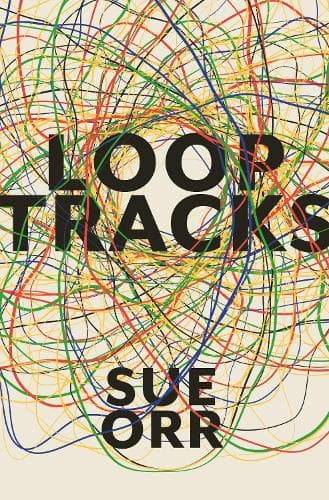Review: Loop Tracks
Reviewed by Holly Walker
Imagine a novel about abortion rights. Now imagine it is also a novel about addiction, euthanasia, autism, ageing, adoption, sexual assault, consent, math, primary school teaching and musical looping, set in Wellington during the Covid-19 pandemic. And imagine that it is not – as you could be forgiven for thinking from that description – too much but a powerful and elegantly structured excavation of intergenerational trauma. This is Sue Orr’s Loop Tracks.
We open in 1978. A plane sits on the tarmac at Auckland Airport, ready to fly to Sydney. Among the passengers are three women making the trip (with support from a women’s organisation) to access an abortion, because for a year or so in 1978 there was no legal access to abortion in Auckland (this, by the way, is true). One of them is Charlie, a 16-year-old schoolgirl whose parents have pooled their meagre savings to pay for this face-saving journey.
But the plane is delayed and sits on the tarmac for hours. Charlie’s appointment at the clinic in Sydney is for 1pm, but it’s nearly that time and the plane still hasn’t moved, and Charlie’s not even allowed to eat the egg sandwiches offered in compensation because she needs an empty stomach for the procedure, and she’s hungry and tired and nauseous and thinking about the boy who got her into this mess, and still the plane hasn’t moved.
Flash forward to early 2020. Charlie is a primary school teacher in her mid-50s living in one of Wellington’s bush-clad hill suburbs with her 18-year-old grandson Tommy, who loves math and Jacinda Ardern and exists “on spectrums.” Charlie loves him fiercely and protectively and has devoted much of her life to helping him navigate the complex social world that can elude him.
Now in his first year at university, he’s started going out at night, drinking and even bringing home a girl, Jenna. Charlie knows she should support Tommy’s new-found independence (and the freedom it also affords her) but she’s struggling. Things get even more complicated when Tommy’s estranged father Jim turns up and the country goes into Level 4 lockdown.
From here, the novel unfolds in parallel, alternating between Charlie’s experiences of the real events of 2020, and repeated reflections on what happened to her in 1978, each one deepening our understanding about how these events have echoed through the decades. It’s absolutely attuned to the zeitgeist, with insightful commentary on many contemporary political debates, but these reflections never feel forced.
There’s so much going on in Loop Tracks that it’s hard to even accurately describe. But that’s just it, isn’t it? We contain multitudes. Charlie, living her quiet life as a grandmother, gardener and teacher, even confined to the house during the Level 4 lockdown, certainly does. We’re all just living our daily lives, holding our loved ones close, having stray thoughts about the issues of the day and, all the time, our actions are largely determined by things that have happened to us in the past. Sometimes that past rears up without warning and must be dealt with more directly. We accompany Charlie through such a moment and through the specificity of Charlie’s experience, Orr offers us a powerful way in to reflect what we all just lived through. Loop Tracks is a remarkable, timely novel.
Reviewed by Holly Walker
